Imagine: You’ve just crested the hill on a long, winding mountain pass in central Nevada. Then your engine suddenly starts making an unfamiliar noise. The check engine light starts blinking rapidly as the engine temperature gauge shoots up into the red. You pull over to the side of the road, and it starts to set in: Your RV broke down. Suddenly, your dream road trip takes an undesired turn.
You glance at your cell phone signal. Nothing. The last house you saw five miles back down the road looked like it was abandoned during the Dust Bowl era. The last vehicle you saw was even further away from the old house. But, the shoulder along the road where you pulled over is nice and wide. You shut things down, and settle in. (Did I mention that it’s getting darker?)
What do you do?
Being Prepared for an RV Breakdown
A Cool-Head Mentality
While this might seem like the set up for a cheap horror flick, keep your head about you. Panic improves nothing. It’s also good to remember: You’re in an RV. That means that you’ve got your home with you. There’s plenty to eat and drink. You have a place to sleep and take care of all your immediate needs for at least one night. By any other vehicle trip standards, you’re already way ahead of the curve.
So, while you’re contemplating your next steps, take a minute to congratulate yourself for being where you are, what you have with you, and the great story that you’re going to tell when you get back! (We promise this helps.)
Personally, we’ve experienced all kinds of engine and trailer related troubles in our nearly 13 years on the road. We’ve experienced everything from a flat tire in West Virginia to a bearing blow out near Happy, Texas (yes, we see the irony) to multiple engine hiccups from sea to shining sea. Nearly all of these breakdowns have been minor, and for some inexplicable reason, seem to occur on a Friday at about 3:00 p.m. (You know, with just enough time to maybe get to a mechanic, but not enough time to do anything about it until the following week.) We’ve only been involved in one semi-serious collision where we were grateful to be able to walk away, but our towing vehicle … well, not so much. (But that’s another story for another time.)
In each case, keeping a cool head has made a big difference in how we tackled our problems.
An RV Insurance Policy
As Edna from The Incredibles reminds us, “Luck favors the prepared!” In other words, you have to be ready for what might happen before it happens.
Starting with good quality insurance is key — whether it’s through your existing auto insurance policy or a separate policy for your RV. While most car insurance covers the liability on anything it tows, it doesn’t necessarily cover anything else like collision or comprehensive. (We nearly found this out the hard way.)
As full-timers, we carry RV insurance that will not only help us pay for repairs, it also covers the cost of alternative housing (i.e., hotel, apartment, AirBnB) for a short time while our home is being worked on as a result of an incident. We’ve only needed it once in nearly 13 years, but it was incredibly helpful (and put our minds at ease) when we needed to replace our trailer’s axle during the pandemic-induced supply shortage over Thanksgiving week in 2020. What could have been a total nightmare turned into an enjoyable week in Santa Fe!
Now, returning to our hypothetical situation where your RV broke down, let’s use that to illustrate how to be prepared for the unlikely event of an RV breakdown. This should help in the event you need do a little RV breakdown triage.
So, your RV broke down. Breathe: Is this something you can repair on your own?
Answer: Yes! As long as I have the tools.
If you’re handy, mechanical, or have earned the wisdom of the wrench, this little hiccup could just be a bump along the way. You’ve got a good collection of tools, and perhaps some frequently worn out parts for your rig along for the ride. Along with those tools, a prepared RVer should have some basic safety supplies. Frankly, if your RV broke down, something is wrong. And now might be the time you need that fire extinguisher.
Even if you don’t have the right tools, you may still have DIY options. Many auto parts stores have a tool loaner program for those more specific tools that might not fit into your repair kit. In addition, many stores have delivery vehicles which can bring them right to you. Believe it or not, many online auto part retailers have same-day delivery options. (So, just ask.) Simply choose that option when ordering, then select on a map where you are and they’ll bring it right to you.
Other options can include delivery services like Doordash or Uber delivery. While it might be more expensive than getting it delivered to your home, it’s cheaper than a tow from the middle of nowhere!
Answer: No way. Can’t fix it.
If you find yourself on the side of the road, with the hood up scratching your head, it’s time to call in some help and there are lots of ways to do it.
Can you reach out for assistance?
Answer: Yes! I still have cell service or Wi-Fi.
When cell phone and internet booster gear pays off …
Many RVers have some sort of internet booster, extra cell phone with a different carrier, Wi-Fi hotspot, satellite internet, or even a spot/personal locator beacon. And frankly, these devices (all designed to function outside of normal cell phone communications) can be super helpful in an emergency and contribute to that prepared feeling. Many of these will allow you to communicate with a towing service, insurance company, or repair shop from anywhere you happen to be.
What to look for in a repair shop …
We’ve mostly had great experiences with tow trucks and repair shop. In 13 years, there are only two that we can think of have made us angry enough to leave a bad review. Vetting the shop before going there might avoid the feeling of being taken advantage of. But let’s get real: When your RV broke down, you didn’t pick the spot. So, it can be hard to get picky when a shop might be the only act in town.
Even so, reading customer reviews (more than one) can help you get ahead of any problems certain shops may have. And once you’re done, pay it forward. Be sure to leave an honest review so others can take advantage of your experience. Do they generally have a good reputation among customers? Are they associated with a national or regional chain? What are your options if you don’t like the vibe you’re getting? Remember: It might be worth a more expensive towing bill than having to deal with a shady shop. Your RV broke down. You’re likely already pretty stressed, so you don’t need more anxiety.
Thoughts on national/regional repair chains …
We’ve had positive (and negative) experiences with both independent and nationally affiliated repair shops. So, we’re not making a comment about quality. Rather, if you choose to go with an independent shop, be sure that they’ll stand by their work if or when something goes wrong with that part or repair.
Understanding what to do down the road may help give you peace of mind. (And some recourse if the repair doesn’t hold up.) Keep good records (with receipts) of ALL of the work that you have done to your rig — both the work you do or have someone else do.
Answer: Nope. No signal in sight.
Don’t discount the kindness of strangers and fellow travelers.
If you can’t reach out with modern technology, you might just have to put out a sign and wait for someone to wander by. A few years ago, we traveled to Alaska from Washington state. We were just one of thousands of travelers all generally heading to the same place. (After all, there’s just two roads to get you there.) Along the way we kept seeing the same people. Even though our schedules differed, we seemed to be in a very long game of leapfrog. A small community of travelers developed, one which we knew we could rely upon should we get into a tight spot.
Additionally, we’ve been helped by locals when we needed it. Frankly, it’s always been a positive experience that restores our faith in humankind. When we ask for help, we open ourselves up. It’s a place of vulnerability, a recognition that even if we are prepared for many things, we don’t have it all figured out. Allowing someone to help you is actually a gift for them and for you.
Think about the last time you helped someone. How did it make you feel? Remember that in your moment of trouble that you can also make someone feel that spark of goodness, that joy of helping out. It takes the pressure off and creates a connection — and possibly a friendship. (Don’t forget to pass it on!)
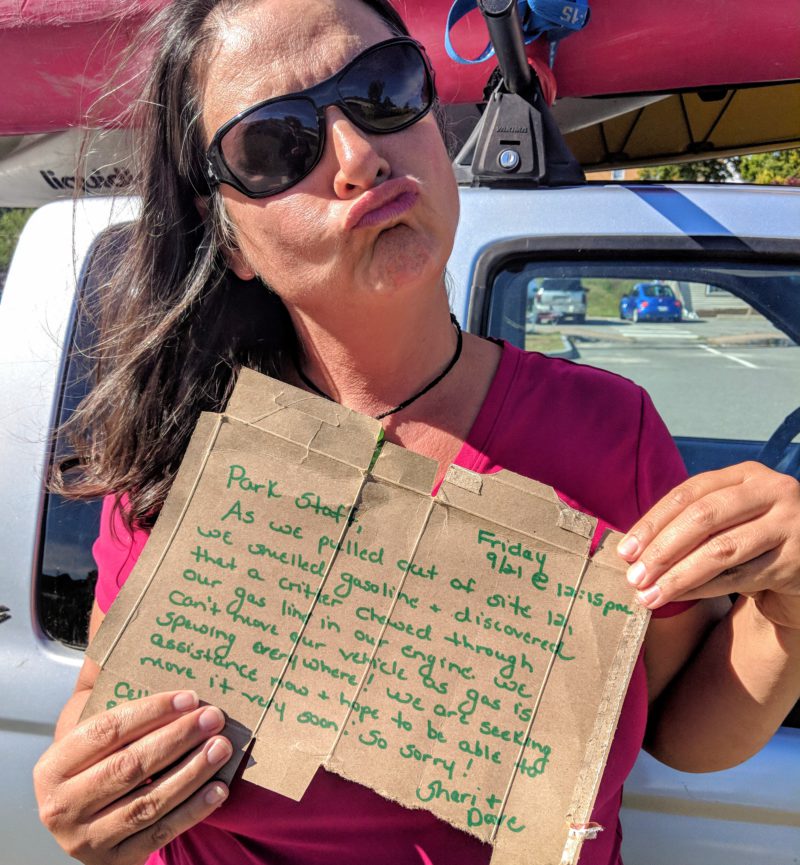
No Matter What, Stay Confident
There’s no better feeling than being prepared for the unexpected, and with just a small investment and an adventurous spirit you can be ready for whatever comes your way. Remember that you got into this activity to have adventures, and unplanned repairs can open you up to a whole new world!
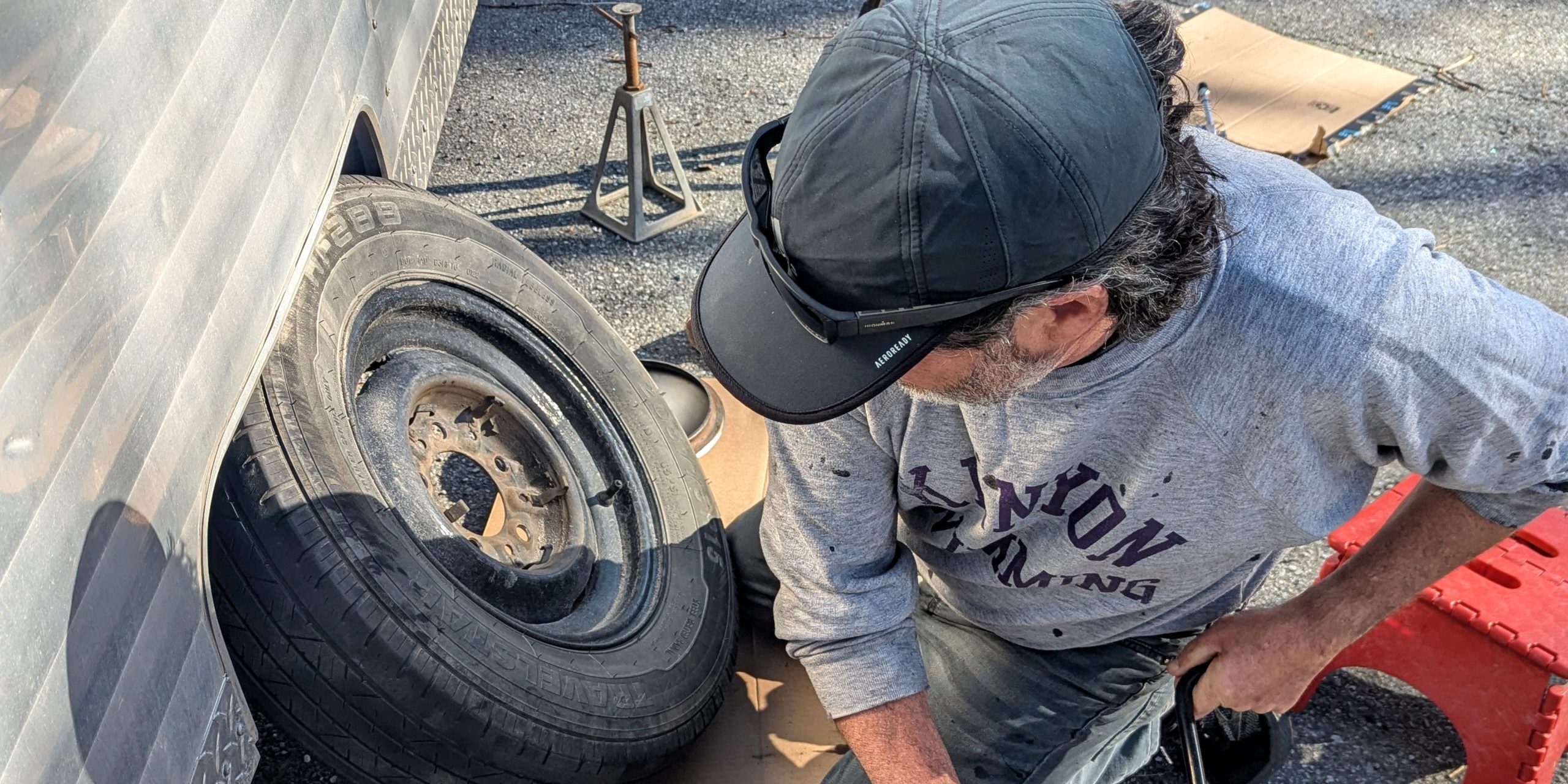
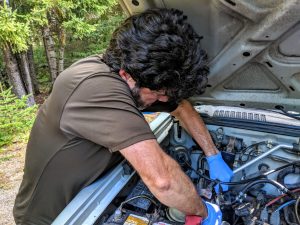
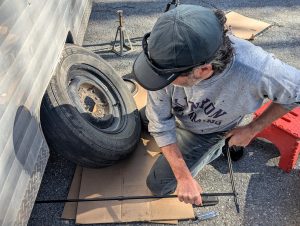
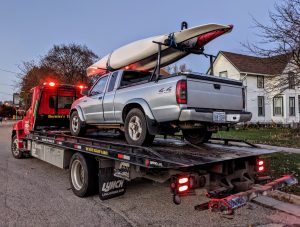
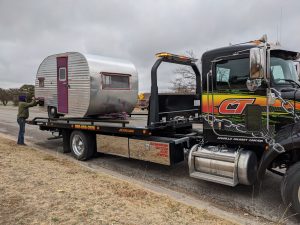
Leave a Reply